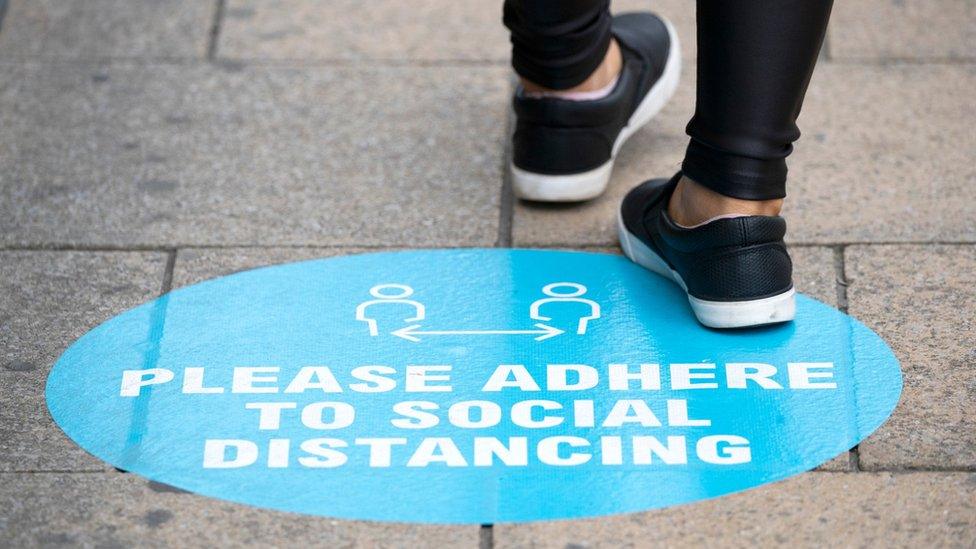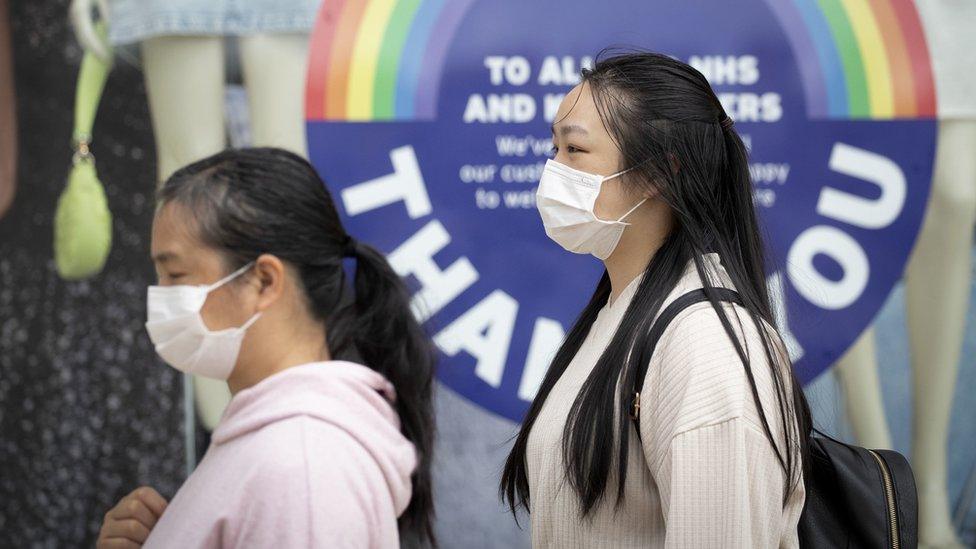Covid in Scotland: Tighter restrictions expected 'within days'
- Published
Covid in Scotland: FM says tighter restrictions expected 'within days'
Additional lockdown restrictions will "almost certainly" be put in place in Scotland in the next couple of days, Nicola Sturgeon has said.
Speaking at her daily briefing, the first minister said "fast and urgent action" was needed to tackle the growth of the virus.
Ms Sturgeon indicated that a package of new restrictions would be announced within the next 48 hours.
A total of 255 new cases were recorded in the past 24 hours.
That represented 6.3% of those tested, the third day running the "positivity rate" has exceeded 5% - which the World Health Organization has said is a key benchmark for a virus to be considered under control.
While no new deaths were reported, the number of people treated in hospital rose to 73, an increase of 10.
Ms Sturgeon said: "I need to be absolutely straight with people across Scotland, that additional restrictions will almost certainly be put in place in Scotland over the next couple of days.
"Hopefully this will be with four-nations alignment, but if necessary it will have to happen without that."

She said a meeting of the UK government's Cobra emergency committee would take place, and that she would be speaking to Prime Minister Boris Johnson directly after the briefing.
Ms Sturgeon added: "In that call, I will impress upon the prime minister my view that we need decisive, urgent and, as far as possible given our individual responsibilities, co-ordinated action across the UK.
"I will be clear that I am willing to allow a bit more time for four-nations discussions to take place before making final decisions for Scotland, but I will be equally clear that the urgency of this situation will mean that we cannot, must not and will not wait too long."
Later on Monday the UK's chief medical officers said the coronavirus alert level should move to Level 4, meaning that transmission of the virus was "high or rising exponentially".
Downing Street confirmed Boris Johnson had spoken on the phone to the first ministers of Scotland, Wales and Northern Ireland, and that they would be taking part in a Cobra meeting scheduled for Tuesday morning.
A spokesperson said: "They all agreed to act with a united approach, as much as possible, in the days and weeks ahead."
Ms Sturgeon tweeted that she would make a statement to the Scottish Parliament on Tuesday afternoon.


It is indeed a critical time in the trajectory of this virus. Cases are going up at a time when we are heading towards winter and the NHS will also have to deal with seasonal flu.
The first minister says "difficult decisions" are to be made in this trade-off. We are being told to prepare for further restrictions on daily life.
The government says keeping schools open and protecting the NHS are priorities, so what else will have to give?
One of the government's own advisers has said travel restrictions and pub curfews could feature.
We are in uncharted waters and no-one can predict what the winter will bring.
What is clear is that we are all going to have to find ways to live with this virus for much longer than the next six months.

Ms Sturgeon gave no detail of what new restrictions would be introduced, but said the government was "very close to a point of decision".
"At the heart of this decision is a simple truth - the longer we wait to introduce new measures, the longer these measures are likely to be in place," she said.
"If we move sharply now to get the virus back under control we can minimise the time we all spend under any new restrictions."
Public health expert Prof Linda Bauld said the likely options could include travel restrictions and curfews or restrictions on hospitality.
Prof Linda Bauld: Hospitality curfews and travel curbs 'likely options'
Ms Sturgeon added that there would be financial support for people required to self-isolate, particularly those on low incomes.
While larger fines for non-compliance were under consideration, she said a better approach was to "remove barriers" to self-isolation.
She said: "Nobody should be forced to choose between self-isolating for the collective good and paying their rent and feeding their families.
"If that is the choice people face, then it shouldn't be a surprise to us that compliance levels will be lower than we need them to be."
The first minister added that the "collective action" of the summer months had not been in vain, and without it the number of deaths would have been "significantly higher".
"We are in a much stronger position now than we would have been without that - but none of it was a magic wand that made the virus go away," she said.
"So as we face winter, as we face an acceleration of cases again, we must act to keep that under control."

The UK government's chief scientific adviser Sir Patrick Vallance earlier warned that without further restrictions there could be 50,000 new coronavirus a day by mid-October. This could lead to about 200 deaths a day UK-wide by the middle of November.
Scotland's interim chief medical officer, Gregor Smith, said cases in Scotland were roughly doubling every seven to nine days.
Asked about suggestions that new restrictions might last for six months, Mr Sturgeon said this was "the length of time we all likely to be living with some restrictions, but it is not necessarily going to be the same restrictions, of the same severity, for that period".
Scottish Conservative leader Douglas Ross said people needed to heed the "stark warnings" about the virus.
"It is right that our governments work together to tackle this, because this is an issue that we need to get on top of," he said.

BACK TO SCHOOL: Can a school insist on a Covid test?
LOCKDOWN EASING: What changes next - and when?
